Abe Mendoza
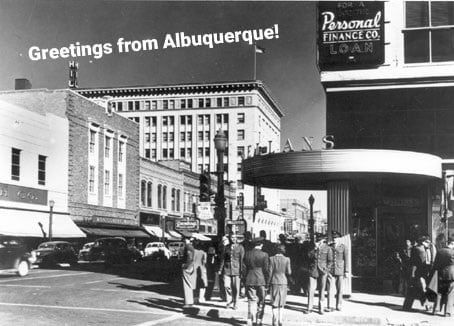
The Legend of Nowhere.
When Ken Halberson arrived in Albuquerque it was just after 5:00 p.m. local time and the weather was cold. An icy wind cut through from the desert valley to the west, swirling against the Sandia mountains up against which the tiny Albuquerque Municipal Airport was built.
New Mexico had been one of the secret heroes of the recent World War. It’s plethora of secret bases, testing grounds, installations, and labs brought about the end of the war and, for the first five years or so after the war, had guaranteed the peace. Now the Russians had the bomb too and the race for what the scientists and politicians called “The Super”—the hydrogen bomb—was underway. In a way, New Mexico was the frontline of the new Cold War. Looking around at Albuquerque off to the northwest and the deserts and mountains surrounding it in 1954 felt to Ken like presiding atop the proving grounds of human destructive capacity. Like Adam’s holy line standing upon the sacred mountain of God, looking down at the valley of sin where Cain’s progeny, unrestrained from engaging in every wicked imagination, slouched inevitably toward God’s wrath.
About 120 miles due south of the city, on July 16, 1945, only a week after the military had established the White Sands Missile Range just outside of Alamogordo, American scientists and military men exploded the world’s first A-bomb, impacting the course of world history forever. A rainbow cloud of sand, glass, and debris had surged upward to 38,000 feet and only a half dozen minutes later the mushroom cloud was visible from Albuquerque. Residents reported feeling the shock wave and seeing the intense light before the cloud rose into the sky like an omen or a signpost of the changing times. The old world was over.
Ken had read rumors from among the military people familiar with the area that only six months before he landed in Albuquerque, in September of 1953, the radioactivity had finally diminished enough at Ground Zero that an open house had been held at the Trinity Site.
Just to the south and the east of Albuquerque was Kirtland Air Base where America’s bomber squadrons, including actor Jimmy Stewart, learned to fly the bombers that would punish Germany and Japan and eventually unleash the A-bomb on the world. The bomb itself was designed and built there at Sandia National Laboratory, housed on the same airfield.
Secret bases and facilities were everywhere in New Mexico, and these were only a few of them. In the land of enchantment, it was like the sand itself concealed dark enigmas and mysteries, and to Halberson, standing pensively in the chill wind, it seemed that the state was littered with rumors and secrets, and rumors of secrets. Here among the machinations of either world peace or world domination (however you chose to interpret it,) the journalist didn’t know what that frigid breeze portended. Danger? Epiphanies? Disappointment?
Whatever the case, Ken Halberson, just in from snowy New York, didn’t mind the cold. What he did mind was that every bar in town was closed (It was Sunday). No liquor stores were open either. No grocery stores had alcohol. Ken had grown increasingly dependent on alcohol since his leg had been blown to bits in Indochina. Journalists are inherently addictive personalities and Ken was no exception. He’d steadfastly refused to get addicted to heroin or other pain killers that were common and easy to attain in Asia at the time. No, he truly believed that narcotics would ruin him. Alcohol, it seemed to him, was a manageable habit. Besides, he reasoned, the greatest writers in the world were alcoholics.

The cabbie who gave him the bad news that New Mexico was dry on Sundays also told Ken he’d never heard of Nowhere, New Mexico and therefore it didn’t exist. He knew because he’d lived in the state since it was still a territory. He was five years old, he said, when New Mexico became a state, and if there was a Nowhere, New Mexico he’d sure enough know about it. He was, however, willing to drive his fare to a bootlegger’s house before taking him to a hotel on the east edge of town where they sat outside in the taxicab and shared the bottle.
Abe Mendoza was the cabbie’s name and Abe was the kind of man who liked to listen and ask questions. And he liked to drink, too. The curious sort you might say. As a journalist, Ken liked the rare occasion of conversing with someone who didn’t just talk about himself. The curious, according to Ken, were the only authentic humans. A reporter generally learns to get other people talking by a rat-a-tat barrage of relentless queries, and people almost never tire of talking about themselves. But even people who know these essential truths are easy pickings when one of their own begins to prod. Old Abe would have made a good reporter, and it didn’t hurt that he oozed warmth and goodwill. Through his heavy Mexican accent, he spoke good and unbroken English, and Abe established himself as an expert on this area of New Mexico. He was also evidently well-learned on public affairs and how those affairs influenced real people.
“Do you remember New Mexico before statehood?”
“No, sir,” Abe said. “I remember life and how we lived it when I was a small child in the territory but the politics of it never impressed me as a child. I am glad we became a state. America is great, and we here are not like those Texans always looking back and pining for something else. I mean, we were part of the Republic of Texas for a while, too. Not in my lifetime, but once upon a time. The treaty signed with Mexico after Texas Independence in 1836 required the Mexican army to retreat to the other side of the Rio Grande, just west of here. We learned of that in school. So, we were Texans too and we have some of that spirit and pride and independence. But we don’t live for those days and we’re glad to be Americans.”
“You know a lot about your history,” Ken said.
“I do. My brain remembers more than my face lets on.”
Ken decided to turn the tables and ask Abe questions for a bit.
“Do you believe there is a perfect place?” Ken said.
Abe took a pull from the bottle then sat for a moment, thinking, letting the warm burn of the alcohol do its work.
“Heaven. Heaven is perfect.” Pause, then, “Yes. Heaven.”
Ken took his turn at the bottle. “This side of heaven? Is there a perfect place on earth?”
A smile played across Abe’s lips so subtle as to almost be missed. He raised the bottle and looked at its label. “If there is, I would not live there. I would visit, but I wouldn’t live there.”
“Why is that?”
“In heaven there will be no sin to mess it up. On earth, an hombre like me could break the world if I was too long surrounded by perfection.”
More silence. Then Abe turned the tables back around.
“What would you do if you visited this perfect place?” Abe asked.
“I would observe,” Ken replied, “to see what made the place tick and what made it perfect.”
“Every observer changes that which he observes.”
Ken must have smiled. Abe knew science too.
“I would try not to break it,” Ken said.
A longer silent pause.
“What do you do, Abe, when you visit the perfect?”
Abe laughed. “Oh, such a place must not exist, but if it did and if I visited it I would be something of a ferryman or a guide. Which is like what I do here. I would take people to the perfect place and then watch their faces. This is, I think, what God does when His children see the sunrise.”
***
Halfway through the bottle, Abe had learned whatever he intended to learn from Ken Halberson, his fare and now his friend. With nary a word nor warning he put the cab in gear and started driving. Ken didn’t ask where they were going. Halberson, the former Marine who had seen his leg nearly blown off outside Tonkin, was sure he was in no danger at the hands of Old Abe Mendoza the inquisitive and pleasant cabbie. There was a peace about Abe that Ken dearly liked.
The two men, now solidly drunk, still arrived in fair enough condition at Abe Mendoza’s humble two-bedroom house just southeast of Albuquerque not far off Route 66. They did not stumble inside. They walked arm in arm like comrades. Despite the late hour, the two new friends ate tamales, beans, and rice served to them by Abe’s happy wife Ophelia. She was happy, it seemed to Ken, when she was of service, which means that she was happy when her husband and friends were eating. Ophelia was not five foot tall, not by a stretch, but she was stocky and strong, and she held the full pan and scooped big ladles of food like it had always been her calling in life. Ophelia kept Ken’s plate full and stood and never sat, hoping that her guest would want more. After two portions, her husband pushed away from the table and went into the bedroom. The sound of a drawer opening and shutting, then he returned with a small, packed bag—like a doctor’s bag—and turned to look at Ken, who was drunkenly shoveling more rice and beans into his mouth.
“Come amigo,” Abe said. “We’ll need to leave now if we’re going to get you to Nowhere and I can still get back in time to work some tomorrow.”
Ken Halberson didn’t ask questions or protest. Somewhere in his whiskey-soaked thoughts was the indescribable clarity that this was where the conversation with Abe had been going all along. He couldn’t say he knew it intellectually, not consciously, but somehow; he still knew.
***
The drive was mostly southward and some degree of east, but beyond that
I didn’t know and at some point I gave up trying to track. The roads were dark and there were no road signs that I could see or read and we shared the bottle as we drove. The wide two-lane narrowed at one point down to a single paved lane and then the pavement disappeared altogether and the car seemed to glide over the desert like a schooner in moderate chop down by Cape Horn, in and around hills and through gaps in those hills, kicking up sand in the tail lights. On occasion Abe would swerve to miss a small animal, a tumbleweed, or a cactus illuminated by the headlights and the hours clicked by as I sometimes slipped in and out of sleep despite what should have been the evident danger of the trip. When I woke again we were still on a dirt road, but this one was wide and smooth and the grade took us upward in altitude until we were winding on this dirt road through what seemed like mountains interminable. I knew we hadn’t stopped for gas, but we’d been on the road for more than five hours and the taxicab was now dangerously running on only fumes and faith.
Somewhere near the peak of the mountains (the dark shapes were still visible only faintly against the stygian sky) the bottle was drained and Abe tossed it into the back seat where it rattled around to remind us it was empty. Then Abe pulled onto an unmarked side road, narrower and steeper in its rise and we wound upward through the last hundred yards of sage and saguaro before pulling to an abrupt stop just near the peak.
Abe darkened the headlights, then got out. I got out too, not wondering if I was going to be murdered and left for dead, but curious how this was all going to play out.
A feeling of danger would seem to be natural for this circumstance but instead I felt only love and adventure and the dull awkward spin of drunkenness.
I followed Abe through the brush and as we crested the peak I looked and there below us in the distance was a small town, ablaze with gorgeous, sprinkled lights in the pre-dawn darkness, seeming to float like a UFO or a ship floating stoically on the placid deep, or a heavenly Jerusalem, lamps kindled against the encroaching night. The town was set off from everything by the blackness of the northern Chihuahuan desert and it was February and I finally remembered in my drunken buzz that it was cold, but not as cold as it had been in Albuquerque because the wind was still and the silence imprinted itself on me like age itself. Like a blanket of time.
“That town is still a half-hour’s drive more,” I said, “and I’m sorry to say but I looked at the gauge and we don’t have the gas to make it.”
“That’s by design,” Abe said. “You aren’t meant to make it from
Albuquerque or anywhere else on a single tank of gas.” He produced a small aluminum flashlight, pressed its button, then moved through the sage and tumbleweeds until we came upon a pile, covered in mesh and canvas. Pulling back the tarp, Abe yanked a metal jerry can of gasoline from the stash before re-covering the remaining fuel cans with the tarp, kicking rocks onto the edges to hold it down from weather and winds and then tossing sage branches on top for good measure.
“No one comes up here ever,” Abe said, “and when I return on my next adventure, I will bring more gasoline.”
***
The pavement started up again just outside of town and by the time we reached the first buildings in the city the street was wide and clean and there were concrete curbs like in any other town in America. I don’t remember seeing a sign that said, “Welcome to Nowhere,” but I was still a little drunk and giddy from the mystery and excitement.
I’ll describe the town later because it was dark then and I was tired, but my first impressions were that everything seemed to be new and there weren’t adobe ruins or dilapidated buildings like those seen on the outskirts of towns everywhere in the American southwest.
Abe drove me to a new looking motor hotel called the Vacation in Nowhere Motor Inn and I noticed that the sign and the building looked like they had been pirated from the Holiday Inn and Howard Johnson’s motor hotels that were now springing up everywhere due to America’s post-war love affair with the automobile and automobile travel. Turquoise and Orange were the predominate colors of the motel and the glass windows, large and ubiquitous, were clean and shined in the glare of the streetlights.
We were now far from there but Route 66 ran north of here out of Texas westward through Tucumcari and Santa Rosa before heading through the mountains and into Albuquerque. During the first 10 minutes of this trip, heading the opposite way from Abe Mendoza’s house, eastward on 66 out of Albuquerque, I’d seen two motor hotels more-or-less just like this one.
Abe got me checked in (he insisted) and carried my only suitcase into the room, turning on the lights and checking the room as he entered.
“I can’t imagine what I owe you,” I said to Abe, “but it’s all on the LIFE Magazine publishing company and Mr. Edward Kramer Thompson – Editor.
Esquire. I can give you a check or cash if you like.”
Abe shook his head. “I cannot take your money, Amigo,” he said. “Mr. Copeland would never forgive me if I took any money from you at all, and I am paid well enough since I have enjoyed your company.”
“But let me tip you, Abe.”
“Do not insult me after such a fine adventure, Amigo” Abe said with a gleam in his eyes. He shook my hand solidly. “I will see you again. If not here than in that other perfect place in the sky.”
And with that, Abe was gone and I was left alone in nowhere. I didn’t ask him who Mr. Copeland was because it seemed that I would find out soon enough.
I was sleepy and the bed was comfortable and I slept like the dead or a man in a dream who wasn’t in a hurry to wake from it.
Downloads
PDF Version
Mobi Version
ePub Version
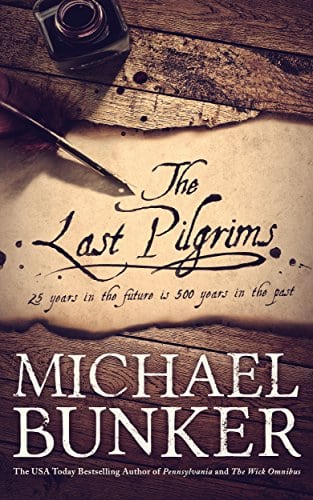
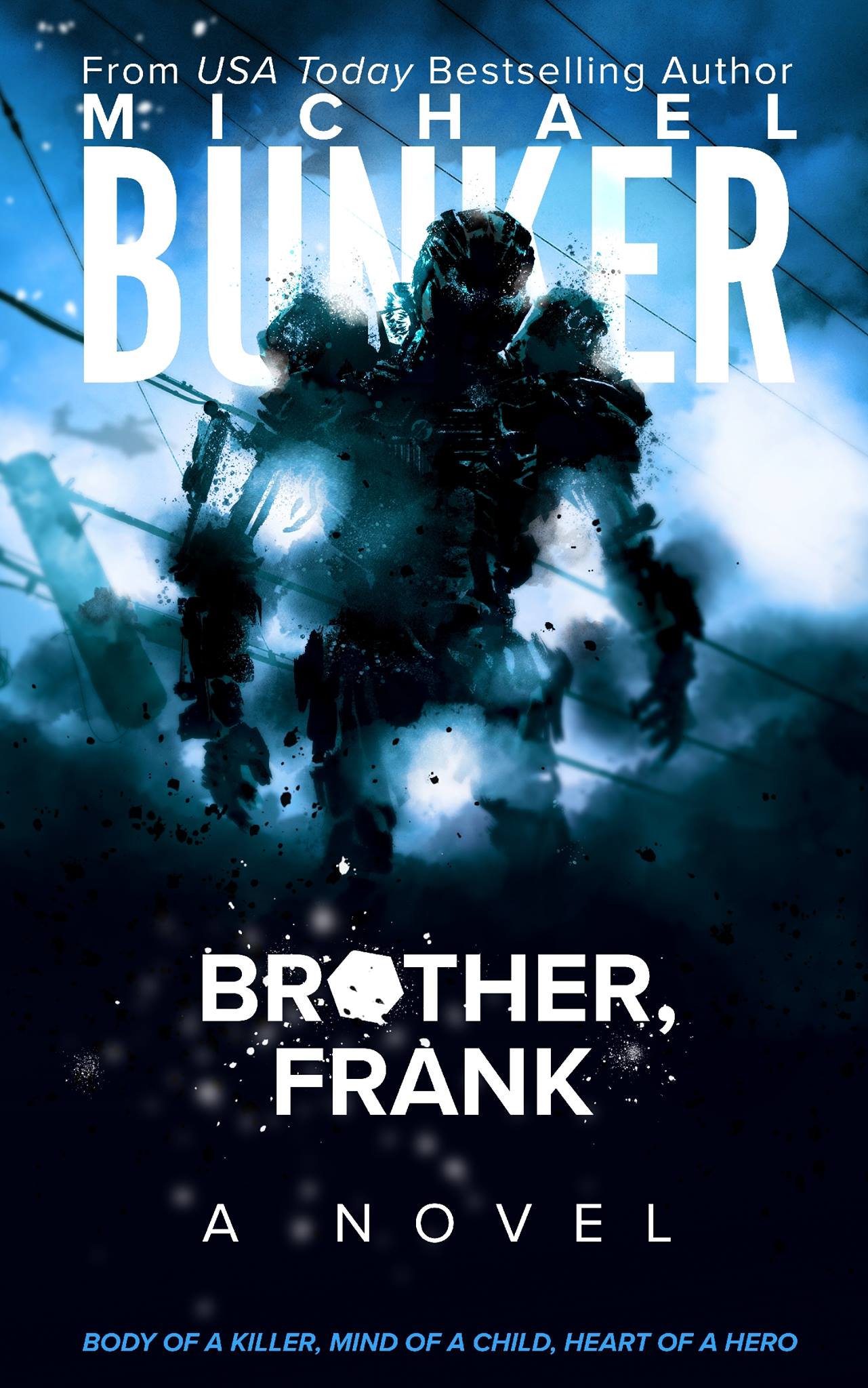
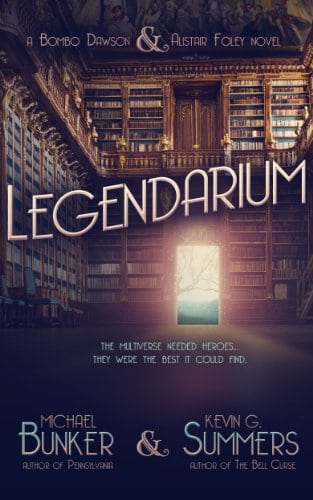
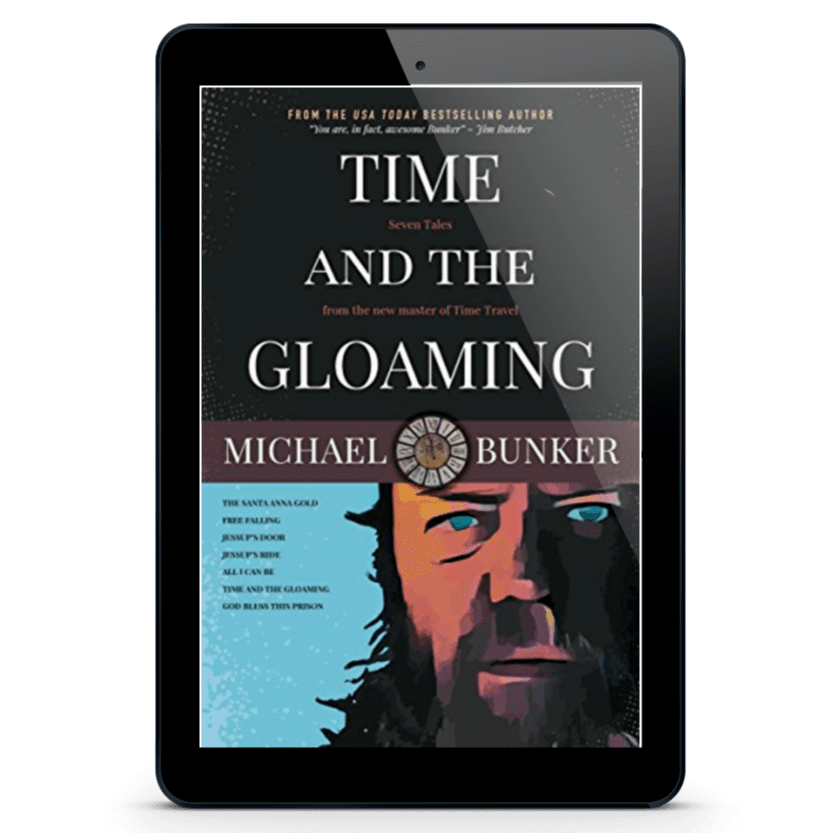
So far so good.
One side observation – I wish there was a way of beginning a story without the main protagonist being the first character in every book. It’s hard to do otherwise, I know….
Also, and this may just be literature in general but I’ll stick with your books specifically, that every character is “competent”. Most of the people in this country aren’t that way but book characters seem to all be able to speak correct English (except for Goa) and can think deeply while being able to express themselves well. That certainly isn’t real life but I get that you have to do that to move a story along. Just some random, dumb observations.
But I am looking forward to reading the rest of the story!
The first character in the book is literally not the protagonist. And the second comment… Anyway, I appreciate you reading it.
I know you can’t do anything about my random dumb statements. It’s just something that bugs me. Most every book written these days shows the “main person” on the cover and then tries to put that person in some perilous situation for drama. They’re the main person. They aren’t going anywhere- just like in the Bond movies. Perhaps the Russian lit folks have me spoiled for good character development and less pandering to the base of people’s interest. Nothing wrong with your stuff. Just lamenting…
Ok, so there are no people at all on the cover, and the book starts with someone other than the main character. I’m not sure at all if you’re having a stroke or you’re reading another book.
I’m making general comments since I hardly ever get to interact with you anymore. Again, I’m looking forward to the laying out of the story as Ken was sort of working.
I too, hoped the story would be more Flemish with non-ambulatory characters, and there would be more goldfish 😉
I don’t know what “Ken was sort of working” means. More?
Sorry, Hal. I’m at work and was just talking to someone named Ken.
Never mind. I’m just dumb.
Well, I am looking forward to any comments you have on the book I actually wrote. 😉
The Introduction is a really great draw. It’s enticing in its mystery.
The pacing of Ch1 is really interesting. I like the way it’s unfolding because this has its own universe the way any fantasy novel would.
We’ve already learned a lot about Ken just from his exchange with Abe. Well done.
Okay, I’m hooked. Twill be interesting how this all falls out. It’s fun when two people click like Abe and Ken. An intangible entangling of two souls that no matter how much time passes they will pick up right where they left off. Probably with Abe holding out a bottle of moonshine and Abe asking Ken, “So amigo. How much of Nowhere will you take with you?”
Definitely instant amigos. Will be interesting when they see each other again.
I’m liking this. A lot.
Palpable. Curiosity peaked. Keep it up!
Great start……. looking forward to more.
Great so far! Abe’s last spoken part – “than” should be “then”
Am I missing the “Next Chapter” button/link somewhere? If not, that would be a good thing to add.
Added them. After Chapter 2 if you scroll down there is a list of all available chapters, but I did add a “Go to Chapter X” button at the end of the available ones.
Chapter one – 2 guys take a drive with a bottle of brew. I can live with that. The immediate camaraderie is immediate ( brew can have that effect). I like the sprinkling of history throughout. I can imagine taking that drive and arriving as the sun begins to dawn over nowhere. So, now the stage is set. Can’t wait to read chapter 2.
Abe reminds me of an older native American man my great grandmother told me about a few decades ago. He had an amazing story of hidden gold. One of these years I plan to write his story. I’m really enjoying the read so far wish I could have had time to read it as you released it instead of playing catchup. At least I don’t have to what for Chapter 2.